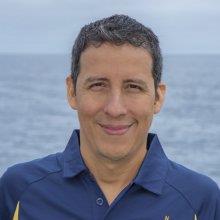
Paul Orbe.
Paul Orbe (CC’94) has been selected as a Science Communication Fellow and will sail aboard Exploration Vessel (E/V) Nautilus during its 2016 expedition. He joined the Corps of Exploration in August as they explore the Greater Farallones National Marine Sanctuary. The Farallones region protects over 400 historic ship and aircraft wrecks, most of them undiscovered. Moreover, this expedition will visit unexplored deepsea coral habitats, some of which lies in the deepest regions of the sanctuary.
Orbe, who will be on the Nautilus until August 27, will be facilitating Q&A during a live stream at http://www.nautiluslive.org after 4 p.m. Pacific Standard Time (PST).
Orbe teaches biology, chemistry and scientific research at the Academy for Enrichment and Advancement in Union City, NJ, is currently pursuing an education specialist degree in Curriculum and Instruction. He has a bachelor’s degree in biochemistry from Rutgers and a master’s in Public Administration.
He earned a Shell Urban Science Educator Development Award in 2016 and the Bayer Fellowship from the National Science Teaching Association (NSTA) in 2014-2015. Since 2013, Orbe has participated in the Research Experiences for Teachers (RET) program at the New Jersey Institute of Technology where he conducts cutting-edge research in the department of Chemical, Biological, and Pharmaceutical Engineering.
Seventeen educators and 22 students from around the world have been selected from a competitive pool of applicants by the Ocean Exploration Trust (OET) to participate at sea during the 2016 Nautilus Exploration Program expedition. The selected educators and students hail from schools, universities, after-school programs, science centers, aquaria and non-profit organizations in 20 states in the U.S. and Australia.
“I anticipate finding additional innovative ways to relate abstract science concepts to real-world applications,” says Orbe. “Ultimately, I aspire to demystify science so more students pursue careers in science and engineering.”
As members of the Corps of Exploration, educators and students will stand watch alongside scientists and engineers, as well as participate in live interactions with shore-based audiences via Nautilus Live, a 24-hour web portal bringing expeditions from the field to future explorers on shore via telepresence technology and social media.
OET promotes science, technology, engineering, and mathematics (STEM) education around the world using the excitement of exploration and innovation to inspire the next generation of scientists and engineers. In 2014, OET began targeting its suite of education and outreach programs to specific communities through an exciting new initiative, the Community STEM Program (CSP). The CSP allows partner communities to engage community members in all of the educational programs OET offers, which are designed to guide young students to early career professionals and educators through a series of programs focused on STEM fields and vocations, increasing the impact the programs can have in any individual location. OET’s focus on the CSP represents a new approach that forges relationships across community partners with the common goal of increasing STEM literacy and proficiency.
An equally important aspect of the program is for Fellows to bring the expedition and excitement of ocean exploration back to their home communities after they have returned from sea by incorporating their experience into classroom lesson plans, community presentation events, and through informal educational opportunities.
About the Ocean Exploration Trust
The Ocean Exploration Trust was founded in 2008 by Dr. Robert Ballard to explore the ocean, seeking out new discoveries in the fields of geology, biology, maritime history, and archaeology while pushing the boundaries of STEM education and technological innovation. Our international program is launched from aboard the Exploration Vessel (E/V) Nautilus, offering live exploration to participants on shore and the public via live video, audio, and data feeds. The major 2016 expedition and education sponsors are the NOAA Office of Exploration & Research, the Office of Naval Research, NOAA Office of National Marine Sanctuaries, NOAA Pacific Marine Environmental Laboratory, the University of Rhode Island, CITGO and additional private donors.

